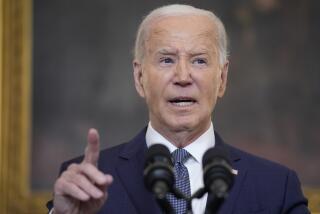No quick solution to Europe’s debt crisis
- Share via
Reporting from Brussels — The leaders of France and Germany said Sunday that they had made progress in bridging their differences over a wide-ranging strategy to combat Europe’s debt crisis but that the “mind-boggling technical complexity” of the task meant they needed until midweek to finish preparing their plans.
Intensive negotiations are continuing between Paris and Berlin, the two heavyweights of the European Union, over how best to increase the firepower of the EU’s $600-billion bailout fund and to reduce Greece’s staggering debt burden. The talks come amid warnings from many analysts that the region’s spiraling debt crisis is fast approaching a make-or-break point.
A comprehensive solution had originally been expected to come out of Sunday’s gathering of the leaders of all 27 EU nations here in the Belgian capital. But French President Nicolas Sarkozy and German Chancellor Angela Merkel said they would present their plan at a follow-up summit Wednesday.
“Things are forging ahead. We have yet to reach a final conclusion,” Sarkozy told reporters at a news conference with Merkel. “We have to take all of the decisions at one and the same time.”
“The devil is in the details here,” Merkel added.
Despite their good-natured appearance together, the two leaders have been at bitter odds over the best way to amplify the bailout fund, which was capable of propping up small indebted nations like Greece and Portugal but is painfully inadequate now that the bigger economies of Spain and especially Italy have been drawn toward the center of the crisis. Experts say the Eurozone must bolster the fund up to four times its present size, turning it into a “shock-and-awe” backstop able to calm jittery investors.
Merkel said their discussions have narrowed down the ways of leveraging the fund to two options. She did not elaborate on those alternatives, except to say that the European Central Bank would not be involved — a victory for Germany, which resisted France’s calls to the contrary.
Berlin favors turning the bailout mechanism into a sort of insurance fund, while Paris fears that being on the hook for extra guarantees could endanger its cherished triple-A credit rating. But Sarkozy’s government has backpedaled from its position in recent days, in a sign that Germany, Europe’s largest economy, is now the country calling the most important shots.
European officials reported progress on another element of the plan: the issue of recapitalizing the region’s biggest banks so that they would be able to withstand steep losses from their exposure to Greek debt and from a possible double-dip recession.
The EU is expected to demand that Europe’s banks raise an extra $140 billion in capital as a cushion against major shocks. The banks are to try to drum up the funds from commercial investors or, failing that, accept cash infusions from their home governments. As a last resort, the European bailout fund could pitch in.
Fortifying banks that hold large portfolios of sovereign debt is important because it would pave the way for Greece to undergo at least a partial default. Many economists describe such a step as imperative if the Mediterranean nation is to have a chance of returning to economic health and slipping out from under a monster debt burden that already exceeds 150% of its gross domestic product.
However, some analysts argue that double or even triple the amount under discussion is necessary to shield Europe’s most important financial institutions. On Monday, the markets are likely to offer a preliminary indication of whether they find the $140-billion figure convincing.
Still to be settled is the question of just how big a loss private holders of Greek bonds, including the banks, should be forced to take in order for Athens’ debt to be brought down to a sustainable level.
In July, Eurozone leaders agreed on an average write-down of 21%, but that is no longer deemed sufficient. Germany is pushing for bondholders to take a 50% or even 60% loss, but France has resisted such big “haircuts,” out of concern that its banks would be much harder hit because they have large holdings of government debt.
Analysts warn that Wednesday’s “grand plan” must address all three issues: leveraging the bailout fund, recapitalizing banks and cutting Greece’s debt. Failure to do so, they say, could throw global markets into even more turmoil and ignite a financial and economic crisis akin to the one that erupted in 2008.
In addition to coming under heavy pressure from the markets, Europe’s leaders have also been admonished by the U.S. and China to forge a solution to a crisis that threatens the global economy. But Sarkozy testily suggested Sunday that other countries ought “not to criticize us so much” since they have problems of their own.
Still, the man whose country lies at the epicenter of Europe’s debt woes, Greek Prime Minister George Papandreou, called on his fellow EU leaders to pull together.
“The crisis is a European crisis,” he told reporters. “So now is the time that we as Europeans need to act decisively and effectively.”
More to Read
Sign up for Essential California
The most important California stories and recommendations in your inbox every morning.
You may occasionally receive promotional content from the Los Angeles Times.











